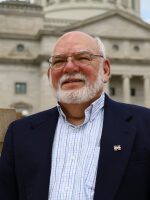From the Arkansas Advocate:
A program aimed at increasing the number of biomedical researchers from underrepresented groups fell victim to the Trump administration’s attacks on diversity this spring.
The Initiative for Maximizing Student Development at the University of Arkansas for Medical Sciences, begun in 2009, had been budgeted $712,108 this fiscal year, according to a website that tracks National Institutes of Health grant terminations. The IMSD program had received $273,558 when NIH terminated the grant in April, according to the website.
A separate National Institutes of Health report shows the project principals received $379,791 in fiscal 2024 and $332,317 this fiscal year.
The grant was one of eight at UAMS that NIH shut down because language in the grant descriptions contained words indicating they might be used to advance diversity, equity and inclusion (DEI) efforts. This included an apparently purely scientific cancer research grant that contained the phrase “trans” in its project description; the tagged word was “translocation.”
Medical school spokesperson Leslie Taylor said by email that, “had they run their entire grant cycle, the loss would have been about $5.5 million.”
“The projects that were funded by the terminated grants have to be shut down because we must maintain compliance with federal initiatives,” Taylor said. “If researchers have funding for different projects, they can possibly move personnel to other funded projects when appropriate.”
Regarding the IMSD grant, she said it was hard to know what extent its shutdown would have on other research because the program “funded graduate students who went on to join labs at UAMS working on various areas of research. Without the IMSD, we can’t admit those additional students, which would impact how many students are available to join our research programs.”
The National Institutes of Health began cancelling grants this spring after a January presidential executive order demanded the end of any programs or grants addressing diversity, equity and inclusion issues. A federal judge ordered a halt to the grant cancellations, but the U.S. Supreme Court in August said the government could proceed to formally terminate $783 million in NIH funding.
The grants to UAMS and other Arkansas institutions were in various stages of funding, according to the grant-tracking website.
A $1.25 million NIH grant to University of Arkansas researchers, for example, was titled “STEAM Education and Training for Underrepresented Students and Teachers in the Arkansas Delta.” When the study was canceled in May, all but $482,257 had been disbursed, according to university public information officer Rebecca Morrison.
The Arkansas Cancer Coalition’s $1.12 million NIH grant aimed to help it develop strategies for reducing cancer and chronic disease in the Arkansas Delta by helping people travel to screening opportunities, according to the grant application abstract. At the time the grant was canceled, the coalition had received $573,304, according to the grant-tracking website. Coalition officials could not be reached for comment.
Among the canceled research projects at UAMS was a $3 million grant to study the utilization of health services among older Black men and whether a universal basic income of $500 a month would improve health outcomes for that population, according to the project description on the NIH website.
The grant terminations haven’t diminished UAMS’ ability to attract major research funds from NIH. Since March, the state medical school has announced more than $12 million in grants for continued cancer research: nearly $3 million to study DNA structures that might affect cancer treatment, $3.4 million to study a virus linked to some cancers that evades the immune system, and $5.8 million to continue studying cancer treatment side effects.
In addition to NIH, the National Science Foundation also canceled eight grants to University of Arkansas researchers worth about $6 million, according to figures provided by Morrison, the university PIO.
UALR received an NSF grant of $269,860 that provided research experiences for undergraduates. Vice Provost of Research Brian Berry said the program was over by the time the grant was canceled, “so there was no impact.”
A similar situation occurred at the UA Fayetteville campus, according to figures from Morrison.



